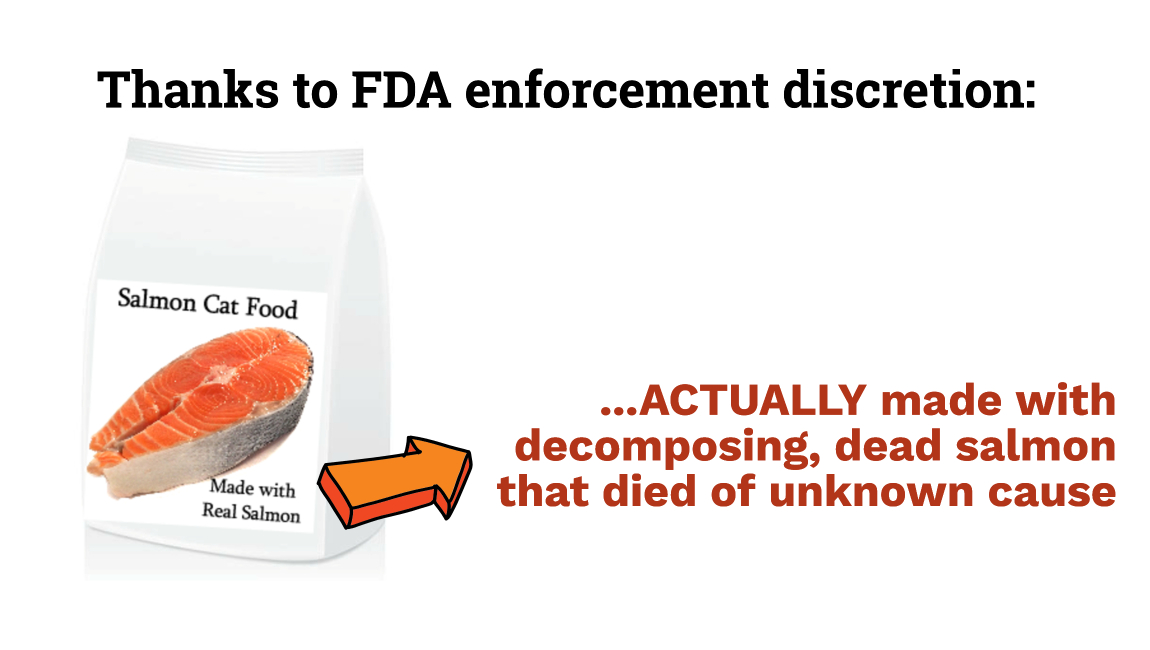Send them to pet feed; the illegal but allowed by FDA waste disposal resource.
Off the coast of Newfoundland Canada are floating pens, home to millions of farmed salmon. In early September 2019, several million of those pen-raised fish unexpectedly died; reports range from two to eight million fish died. Reports also range from algae bloom to warm water as to the cause of the fish die off.
While most of the news stories focus on the financial loss of the fish industry and/or the future of pen-raised fish, a couple of news stories mention a concern significant to pet owners:
“The 2.6 million salmon carcasses will be delivered to another company to be processed and turned largely into cat food and other animal feed.”
Source: https://www.thechronicleherald.ca/news/canada/26-million-farmed-salmon-dead-on-south-coast-of-newfoundland-company-says-363123/
“The dead fish are not without potential use, Card said. They will be transported to a rendering plant and could be repurposed in a variety of ways, such as pet feed.”
Source: https://www.cbc.ca/news/canada/newfoundland-labrador/salmon-aquaculture-environment-climate-change-death-1.5295014
The worst part…
Pet owners will NOT be told that the salmon pet food they purchase was sourced from dead farmed salmon…floating dead in pens until the decomposing carcasses were physically removed by divers.
Pet foods made with these dead, decomposing salmon ARE NOT required to disclose the true quality/condition of the ingredient. In fact, the FDA will allow the dead, decomposing salmon to be processed into pet food with a picture of fresh salmon steak on the label completely misleading pet owners to the quality of ingredients.

Did anyone consider that the cause of the salmon deaths could later cause illness in pets when the decomposing carcasses are processed into a pet food? It doesn’t appear so. The FDA openly allows diseased animal material to be disposed of into pet food. As recent as April 30, 2019 – the FDA stated: “We do not believe that the use of diseased animals or animals that died otherwise than by slaughter to make animal food poses a safety concern and we intend to continue to exercise enforcement discretion where appropriate.”
“Enforcement discretion” is the FDA’s way of saying illegal waste disposal into pet food without disclosure to pet owners.
Should you wish to tell the FDA how you feel about the illegal waste the Agency allows in pet food – please email them at AskCVM@fda.hhs.gov.
My thanks to CatFoodIngredients.com for forwarding me this story.
Wishing you and your pet(s) the best,
Susan Thixton
Pet Food Safety Advocate
Author Buyer Beware, Co-Author Dinner PAWsible
TruthaboutPetFood.com
Association for Truth in Pet Food

Become a member of our pet food consumer Association. Association for Truth in Pet Food is a a stakeholder organization representing the voice of pet food consumers at AAFCO and with FDA. Your membership helps representatives attend meetings and voice consumer concerns with regulatory authorities. Click Here to learn more.
Find Healthy Pet Foods in Your Area Click Here
What’s in Your Pet’s Food?
Is your dog or cat
eating risk ingredients? Chinese imports? Petsumer Report tells the
‘rest of the story’ on over 5,000 cat foods, dog foods, and pet treats.
30 Day Satisfaction Guarantee. www.PetsumerReport.com

The 2019 List
Susan’s List of trusted pet foods. Click Here to learn more.



























Dominique
October 14, 2019 at 1:19 pm
Enforcement discretion – smacks of alternative facts.
Ashlee Luke
October 14, 2019 at 1:36 pm
And the FDA has been beating their drum to the tune that their zero tolerance policy was established to protect vulnerable populations…
So what if a child picked up this pet food containing decomposing, dead salmon and decided to eat it… where is the protection here? And of course any illnesses that could affect our beloved pets, as Susan describes.
This further ignites my passion to advocate for species appropriate, naturally raised and handled raw foods.